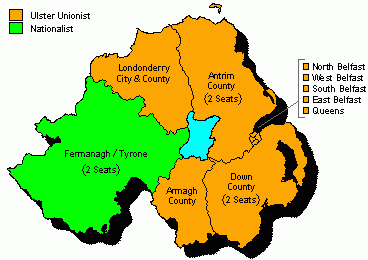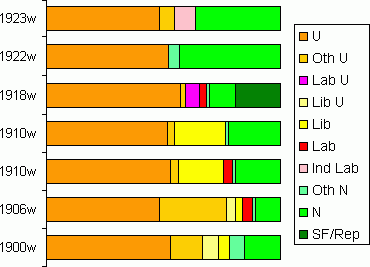

 |

|
| |
|
|
Friday April 4, 2025
|
Much of the election campaign focused on the topics of rising unemployment and tariff reform, an issue that also divided the Conservatives. When the votes were counted, the Conservatives had lost 86 seats along with their overall majority. At 258 seats they remained the largest party, followed by Labour on 191 seats and the Liberals on 158 seats. In the first session of the new Parliament, Baldwin’s government was defeated in a confidence motion and he immediately resigned. The responsibility then fell to Labour leader Ramsay MacDonald, who with the acquiescence of the Liberals, formed the first ever Labour government, albeit a minority one.
In Nothern Ireland, the Unionist government under Craig was continuing to bed-down the new state. The government faced economic headwinds with high levels of unemployment and the introduction of customs barriers by the Free State, impacting border communities. The Civil War in the South had ended in May of 1923 and while the return to law and order was welcomed, it also meant that the Boundary Commission would be established, something the Unionists vowed to resist.
The election produced an almost identical result to the 1922 contest. Twelve of the 13 sitting MPs were successfully returned. The only change was for the Queens University seat, where Sir William Whitla retired and was replaced by Unionist colleague Col. Thomas Sinclair. The Unionist Party faced opposition in only three constituencies; they were challenged by an Independent Unionist in North Belfast, an Independent Labour candidate in West Belfast, and by Nationalists in the two-seat Fermanagh and Tyrone. With the exception of the two Fermanagh and Tyrone seats, the Unionist Party won the other 11 seats.

This map by Conal Kelly shows
the winner in each constituency in 1923.
| Party | Votes | % Share | Seats Won | |
| Unionist | 117,161 | 48.4% | 11 MPs | (Antrim (2 seats), Armagh, East Belfast, North Belfast, South Belfast, West Belfast, Down (2 Seats), Londonderry and Queens University. |
| Nationalist | 87,671 | 36.2% | 2 MPs | (Fermanagh & Tyrone (2 seats)) |
| Indepenent Labour | 22,225 | 9.2% | ||
| Independent Unionist | 15,171 | 6.3% |

Other sites based at ARK: ORB (Online Research Bank) | CAIN (Conflict Archive on the INternet) | Northern Ireland Life and Times Survey
Your comments, please! Send
an email to me at nicholas.whyte@gmail.com.
Conal Kelly, 10 October 2007.
|
|
Disclaimer:©
Nicholas Whyte 2005 Last Updated on Saturday, May 07, 2005 09:42:49
|